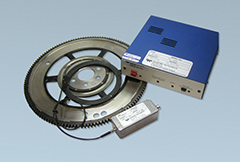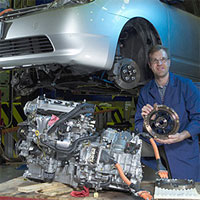FPT100D Engine Torque Sensor
 |
|
|
|
|
Teledyne LeCroy Test Services (TLTS) has developed a Non-Contact Torque Sensor to address the challenging application of measuring automotive engine torque.
This was accomplished by customizing and instrumenting the Flex Plate or Flywheel which connects the engine crankshaft to the torque converter.
The resulting high quality, dynamic torque signal allows the automotive development engineer to understand the actual engine output before it is damped by the torque converter.
This data can be used to examine engine harmonics or filtered to obtain an average value for engine and transmission development purposes. The FPT100D system can be very helpful in the development and confirmation of ECM torque algorithms.
Many clients are using a unique adaptation of the FPT100D to measure torque paths in hybrid powertrains.
 |
| Teledyne Flexplate used by Center for Transportation Research |
Features:
- Replaces existing flex plate/flywheel, no additional space required
- Inductively powered, no batteries or slip rings
- Remote shunt calibration capability
- Analog output with 1 kHz frequency response, user selectable scaling
- Turnkey installation available with 0.5% accuracy NIST traceable
- Temperature compensated from -40 to +120 C
- Measure piston pulses and engine harmonics
- Two channel versions available for measuring thrust, strain or temperature
Applications:
- Engine development
- Transmission development
- Hybrid powertrain development
- Torsional analysis
- Racing
Specifications:
| FPT100 Torque Sensor Flex plate/Flywheel | |
| Torque capacity: | Dependent on engine output size, typically ±750 ft-lbs |
| Calibration range: | 0 to FS |
| Operating temperature range: | -40 to +120°C |
| Environmental concerns: | Completely weatherproof |
| Maximum speed: | 7000 RPM (Contact factory for higher speeds) |
| FPT100D Stationary Electronics | |
| Combined accuracy: | 0.5% FS |
| Calibration: | Remote shunt calibration (momentary toggle) |
| System frequency response: | 1000 Hz (-3dB) |
| Filters: | 1000 & 20 Hz selectable |
| Output signal: | 0 ±5 VDC (scaleable) |
| Input power requirements: | 8-32 VDC, 1.6 amp @ 12V |
| Operating temperature range: | 0 to 70°C (32 - 158°F) |
| Physical size (LxWxH): | 9.0" x 4.1" x 3.1" |